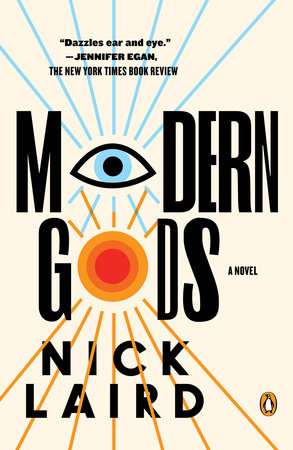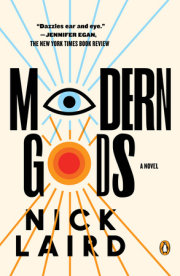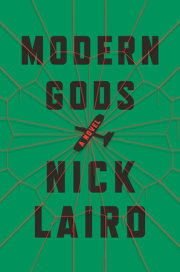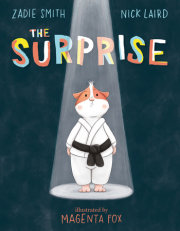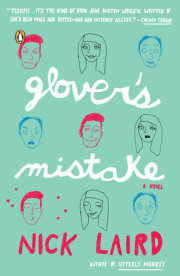From CHAPTER 2 of Modern GodsThe moment the students filed out of the classroom, Liz felt humiliated. She could never entirely shake the suspicion that they had been laughing at her moments before she entered, and then at best they seemed indifferent and at worst contemptuous through the long three hours that followed. The ideal of teaching was surely to produce something like a gravitational effect when one walked into the room. She’d certainly had dons like that: dry, thickly draped women with hair in retentive buns; or Professor Paulson himself, who would walk up the lecture hall to a silence that gathered and gathered until only the sound of his footsteps ascending to the podium were heard. But lately Liz found herself forced to the conclusion that she was of a differ- ent stripe, the kind of teacher who talks fast because she’s not entirely sure of her facts, directs questions to the logorrheics to waste time, and forgets her grading, or forgets to do it, and whose lesson plan is three lines long and most weeks consists of reading out chapters of her own far-from-finished book. She couldn’t get her act together. Although the classroom engendered panic, it was never quite enough to spur her into useful action. Now she closed the door behind the last shuffling backpack, fell into one of their empty seats, and at once opened her Gmail, looking for relief, distraction, and read: LIZ: URGENT DISASTER which seemed an accurate if brutal definition.
Liz, darling, it’s Margo— It’s been so long! Too long! I still think back to the Myth project with such affection and such pride and I’ve been hoping to work with you again for the longest time. I heard you were teaching in America so I hope this e‑mail finds you happy and well and ensconced in life stateside. But not *too* happy and not *too* well! Because I need your help! A somebody called Charlotte Taylor-Anderson had been lined up to present
The Latest of the Gods—a documentary about a religious movement in New Ulster, an island off the coast of Papua New Guinea, for
The State of Grace, a special season on religion the BBC were doing—but this Taylor-Anderson had just broken her back on an artificial ski slope in Perthshire. Margo had an experienced cameraman lined up who’d done an Attenborough series, the permits were in place, but she lacked a presenter. They were meant to shoot next week. Would Liz consider stepping in?
Several PDFs were attached, including a newspaper clipping from the
Sydney Morning Herald, “A New God in New Ulster,” written by Stan Merriman. Liz skimmed the article. A cargo cult prophet named Belef had started a movement called the Story, which merged some of the local reli- gions with Christianity, and threw in a bit of political independence. The missionaries were all stirred up. The most surprising thing seemed to be that Belef was a woman.
Could she do this? She’d have to go back to the apartment and get hik- ing gear and waterproofs, more contact lenses, a couple of books—maybe William James’s
The Varieties of Religious Experience, and there was that Peter Lawrence one on cargo cults. She opened Google Earth and called up New Ulster. Curved like a scimitar. Entirely green. A chaos of peaks and valleys. When she tried to zoom in, none of it, not an inch, appeared to be mapped.
The excitement propelled her effortlessly along, all the way home, until she reached the front door of her own studio. She knocked, got no answer, and began to look for her keys. She jiggled away the loyalty key rings for various pharmacies, opened the door, and look, there was a man she didn’t know standing in her kitchenette. He wore a green T-shirt that had the words “Some Crappy Band” printed on it, purple underpants, and one red sock—the other foot was bare and long toed and dirty looking. Clearly not a burglar. It occurred to Liz that she had for once occasioned some- thing like a sudden atmospheric change—her presence used up all avail- able oxygen. Atlantic, her useless dog, butted at her shins and whined. Joel was also standing—also wearing a T-shirt and pants—on the far side of the bed, breathless, saying, “Liz, hi, I didn’t—this is Jeff.”
“Okay.”
Liz said it very slowly, testing the weight of the word on the room. Nobody replied. Joel was for some reason on the verge of smirking. She turned towards Some Crappy Band.
“Hello.”
“How’s it going?”
The man in the kitchenette spoke with no embarrassment or shame. Re- ally quite cheerful, considering the situation he now found himself in. There was some disjunct going on here. Tall and freckled and milky-skinned with light brown eyes, somehow even more Joel’s opposite than she was, gender aside. A farm boy with that fleshy softness. Innocent as butter. And a dark wet coin on the front of his purple briefs.
Joel said, “Weren’t you going straight to Newark?”
There was no need to answer this, but she found herself doing so: “I got an e-mail. I’ve been asked to present a TV show . . . in Papua New Guinea.”
Joel was nodding foolishly.
“Amazing,” he whispered across the bed.
Atlantic butted and pawed at Liz’s knees.
The man said, “A TV show? Cool. Very cool. And very cool of you to let Joel crash here.”
“Oh. Well. I am nothing if not cool.”
What was she saying? She felt her fury being ousted by some kind of ironic pose. And there was an inconvenient pressing in her bladder that was now a matter of some urgency. In her tiny bathroom, only a rattan door separated her from the rest of the studio, she turned on the tap to camouflage the sound of her ablutions. But now she couldn’t hear them. Were they whispering? She stopped the tap, and waited. Nothing. She turned it on again.
Crap Band. She’d seen him before, at the SoulCycle class a few weeks ago. He’d worn a green, deep-cut sleeveless vest and sat on the other side of Joel. When Joel dropped his water bottle Crap Band picked it up. It was Liz’s first time and she had not returned. But Joel now went every other day to hear Madison shout, “The body does what the mind tells it”— which had never been Liz’s experience. She sat on the toilet and gripped the edge of the basin in front, pissed while staring dumbly at her hands, the way Atlantic pissed, as if it were happening to somebody else. Like the end of this relationship. Apparently unfolding right now, though it some- how felt like it was happening to somebody else.
She’d first met Joel in the lobby of the Standard hotel. A young Asian man sat eating by himself nearby, facing a wall. He wore a black tie and a white shirt, and she’d realized he worked here and was on his break. Widely spaced eyes and a tiny bud-mouth, grinning intensely at her. Then he was not there—then materialized again from behind a very tall black woman in a silver lamé body suit. He was coming towards her, weaving between tables. Shorter than she might reasonably have hoped for but proportionate. Ran a hand through his fringe and squared his shoulders, which endeared. She’d studied the melt of ice in her glass and swirled the blunted cubes around with the straw. Here, here he was. The most marvel- ous cheekbones and thin mocking eyes.
“You’ve really got to stop staring at me,” he had said.
All delightful. But beginnings always are. They tell you nothing. It’s the end of the affair that brings the real information.
Washing her hands, delaying reentry, she looked at herself in the mir- ror above the sink. She made herself bare her teeth like a monkey, then dried her hands on the towel and walked back into the crime scene.
Jeff put his hand out and Liz shook it meekly, not meeting his eye. He’d pulled on a pair of unclean denim dungarees that were a few inches too short, and now he punched his way into a frayed plaid shirt and began buttoning it up.
“Good to meet you finally. Joel talks a lot about—”
“Jeff,” Liz repeated dumbly, setting her bag down on the chair. “That’s right. Jeff.”
“This is my flat,” she said, as if that were news.
“Hey, you know,” said Jeff, spreading his arms. “I’m sorry if any of this is awkward for you.”
Three mason jars were standing on the kitchen counter—one green, one purple, one yellow—and each held some kind of fetal-looking object.
“They’re mine,” Jeff said, following her gaze. “So, I pickle? Pretty much every vegetable you can think of, really. It’s a hobby. . . . I brought a few jars over for Joel.”
Liz turned her full attention to Jeff, and looked into his brown eyes. Too late he understood that he shouldn’t keep mentioning Joel’s name. It poked up out of his speech like a swear word. They both looked at the name’s owner; at some point he had climbed back into bed and there was a definite sense of bemusement coming off him. He was wearing her Montclair T-shirt, and it was on inside out.
Joel said, “I’m sorry about this, Jeff—”
“You’re apologizing to
him? Really?”
“Can we do this later?”
“Oh, I think we need to do this now.”
“These things happen,” Joel said. “We agreed monogamy was . . . not for us. You said that you—Liz!”
She had decided to kick over the chair on which she’d hung her tote, but her foot got entangled in the strap and she stumbled slightly, had to hop. Enormous lovely Jeff steadied her with a hand to the shoulder, which Liz shrugged off. She had an urge to rip something up, but the only thing she could see was some junk mail on the oven. She lifted it but saw now it was a bill from Con Ed and they were a massive pain to contact and she set it down again. Jeff the pickler left a minute later, having silently wrapped his three jars in hessian sacks and placed them in an old blue Pan Am bowling ball bag. Joel finally found the decency to look unhappy, and Liz righted the chair and sat in it and stared at him.
__
Eleven minutes later Joel set his holdall and three plastic bags by the door, and sat down on the edge of the bed, facing her. He placed his fingertips together and, as if admitting something, sighed and said, “I hate to think you’re unhappy. That I’ve made you unhappy.”
Liz felt her own silence working on him as punishment, and she kept it up and stared at him. Was it the fact it was a man? Did that make it better or worse? The morning after they’d first fucked, which was the morning after they’d first met, she and Joel had gone for coffee at the Moonlight Diner a block down from her apartment. Peaceably hungover, him back in his waiter’s uniform, they’d studied their respective magazines and Joel had ordered eggs—no yolks—and mentioned, offhand, that his last rela- tionship had been with a man.
She’d just sipped her green tea and smiled and said, “In this economy you got to diversify.”
How brave, the new world. She slid the menu between the salt and pepper shakers and went back to Shouts & Murmurs, feeling the fond glow of her progressive nature.
After two months of very casual dating, Joel’s sublease in Astoria ex- pired and he asked her could he stay at hers for a week. Some cocaine had been taken and she’d readily agreed. That was three weeks ago.
But they were having fun. She liked him being around.
But now it was not fun, and now she did not like him.
Why was one thing always followed by the other? Why did no emotion hang around for very long?
“Did you fuck him or was he fucking you?” Joel looked disappointed in her.
This was almost enjoyable. Bring on the heteronorms. Bring on the suits and ties. These kids were too free. They were having way too much fun. Bring back standards, family values and monogamy and chaperones, modesty, lowered hemlines, the death penalty. These kids with their Tin- der, their Grindr, their 3nder, their constant fucking. It was too much. Joel was nine years younger and it occurred to Liz that the difference in their races, in their nationalities, in their sexes, was irrelevant. It was re- ally a question of where you sat in relation to time. Did she have more in common with a thirty-four-year-old anywhere in the world than with this twenty-five-year-old in front of her? Was it self-sabotage? Did she want to get married? Did she want to have children? Did she want what she was supposed to? Sometimes. Sometimes she really thought she did. But mostly she did not.
Atlantic was scratching against the cupboard under the sink, where her food was kept. Pointless fucking dog. What were you doing while this was going on? Sleeping? Watching?
Joel was sorry she’d reacted like this. Liz was sorry he was such a total cock.
Joel was sorry she was so consistently uptight and hadn’t she dis- cussed this with her therapist?
Liz was sorry he thought it was fine to behave like such an entitled asshole.
Joel was sorry she was so limited and bourgeois and prejudicial and narrow-minded.
Liz was sorry he was such an unbelievable fucking cock.
The door shut behind him and she sat and stared at it and felt herself collapse in stages, like a marquee.
She was picking bits of wax out of Atty’s ears and rubbing them into her sock when her phone beeped. Alison. Amazing. One of her sister’s gifts—perhaps her sister’s only gift—was to contact people at their weak- est, lowest, most humiliated point. Across oceans, across time zones—no doubt across light years and galaxies and the expanding unfathomable distances of deep space—Alison could smell it. The inimicable scent of sibling disaster. She was getting married—for the second time, admittedly—but still, Liz was getting nothing, was getting shafted, left alone again. . . . She stuffed the phone in a crevice of the duvet nest she had constructed. It was silent for a few seconds then buzzed again. She willed herself to draw it out.
Flight on time? All OK? looking 4ward to catching up x __
The sun had sunk out of sight, but the glass sides of the skyscrapers down- town gave back its old lion face. A diffuse ruddy light fell on the upper stories of the brick edifice of London Terrace. Liz tightened the left strap of her rucksack and considered her circumstances. No boyfriend meant no dog sitter.
There were no cabs. She needed to take Atlantic to her cousin Marcus’s flat, if he’d take her, and then head straight to Newark. Even if the fuss Marcus caused about Atlantic was tedious—setting a tea towel on his lap before the dog sat on him, ostentatiously picking the yellow hairs off his black sofa and dropping them into the toilet bowl—there was no one else.
She flicked through her phone. Who was Jason? Who was Lesley? Who was Nicky P? Man or woman? Friend or foe? Atlantic’s charms were far from legendary. She scrolled back to marcus and hovered her thumb above the name. Atlantic was giving something an exploratory chew. Liz crouched and pulled an Almond Joy wrapper from her slippery and unre- sisting teeth. She texted Marcus—BIG DOG FUCKUP: ANY CHANCE YOU COULD TAKE FOR A FEW DAYS? RIGHT NOW?—and walked north for a block before Marcus replied. He was in Hong Kong and it was 6:00 a.m. in the morning. He hoped that nothing was wrong and that she was doing OK—the kind of text that is like a plea to end the matter there. Liz took off the rucksack and sat on it on the corner of Twenty-fifth and Tenth. It happened like this. You were fine you were fine you were fine, and then you fell apart.
Copyright © 2017 by Nick Laird. All rights reserved. No part of this excerpt may be reproduced or reprinted without permission in writing from the publisher.

